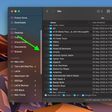Following U.S. President Donald Trump's decision to pause some of the exorbitant tariffs that he put in place earlier today, he spoke to the press at the White House and provided some commentary that could be a positive for Apple.

When asked whether he would consider exempting some U.S. companies from the tariffs in the future, Trump said that he would. "As time goes by, we're going to take a look at it," he said. "There are some that by the nature of the company get hit a little bit harder, and we'll take a look at that," he added, claiming that he will "show a little flexibility."
During Trump's first term, Apple CEO Tim Cook was able to persuade Trump to exempt Apple devices from the tariffs that Trump put in place, but Cook has not been successful this time around. Trump has not yet agreed to grant any companies a reprieve from the tariffs yet.
Trump announced the unexpectedly high tariffs last Wednesday, sending the stock market spiraling downward and causing Apple shares to drop close to 20 percent. Losses continued until today when the temporary pause was announced, and the market closed with Apple stock back at almost $200 a share after opening at $172.
Trump announced a 90-day pause on all of the special "reciprocal" tariffs that were in place, such as the 46 percent tariff on Vietnam and the 32 percent tariff on Taiwan. The 90-day pause does not apply to goods from China, and there is a 10 percent base tariff in place while the higher tariffs are on hold. Trump raised tariffs on China to 125 percent, effective immediately, and said that he put the other tariffs on hold because "people were getting a little queasy."
When speaking to the press, Trump reiterated his aim of bringing manufacturing to the United States, and he claimed that Apple "building" in China is unsustainable.
If you look at Apple, Apple is going to spend $500 billion building a plant. They wouldn't be doing that if I didn't do this. They'd just keep building them in China. And that's unsustainable.
While Apple is indeed investing in the United States to build Apple Intelligence servers at a facility in Houston, Texas, the bulk of device manufacturing will remain overseas. It is not possible for Apple to move its incredibly complex supply chain to the U.S., due to costs and a lack of workers skilled in advanced manufacturing.
Apple will need to pay a 125 percent tariff on all goods coming to the United States from China, but it can import devices from other countries like India, Taiwan, and Vietnam at the lower 10 percent rate.
Note: Due to the political or social nature of the discussion regarding this topic, the discussion thread is located in our Political News forum. All forum members and site visitors are welcome to read and follow the thread, but posting is limited to forum members with at least 100 posts.




















